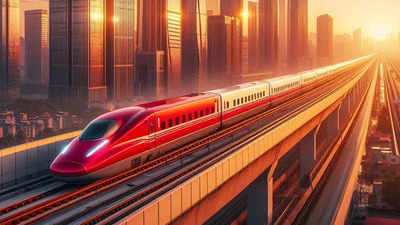- Joined
- Jan 24, 2024
- Messages
- 3,739
- Likes
- 1,971
India’s Hyperloop leap: The future of ultra-high-speed travel begins now
Opinion by Anil Nair

India’s Hyperloop leap: The future of ultra-high-speed travel begins now
Mass transportation, apart from the sheer volume of passengers and freight, isn't something India tends to be remembered for. But this may change with the advent of ultra-high-speed rail (UHSR), or hyperloop. The concept was first published by Elon Musk in a 2013 white paper, 'Hyperloop Alpha'.
Hyperloop envisions pods carrying passengers or cargo in near-vacuum tubes at speeds approaching that of aircraft. Reduced friction and magnetic levitation enable significantly abbreviated travel times, reducing energy consumption and emissions compared to traditional modes.
India commissioned a 422-m hyperloop test track - the world's longest - in December 2024, developed by Avishkar Hyperloop at IIT Madras, in collaboration with the Indian Railways and L&T Construction. Last month, TuTr Hyperloop, another IIT Madras-incubated deep-tech startup, working with Swisspod Technologies, conducted India's first commercial hyperloop pod test run.
The primary challenges this new tech will encounter relate to infrastructure costs and technological hurdles. Safety concerns dominate discussions now, as the tech is in its nascent stage, and the regulatory framework is a work-in-progress.
While estimates put the global UHSR market at $6.6 bn by 2026, the market could explode if trials work. Richard Branson's Virgin Hyperloop is working on projects in the US, Saudi Arabia and Dubai. Hyperloop Transportation Technologies is building a commercial prototype between Abu Dhabi and Dubai that will cut travel time from 1.5 hrs to 12 mins.
Musk's Boring Company has built a test tunnel in California and is talking about getting from DC to NYC in under- 30 mins, a distance flights take 80 mins. TransPod, a Canadian company, aims to reduce Toronto-Montreal travel time substantially, while the India-based DGW Hyperloop has completed a feasibility study to connect Delhi and Mumbai, aiming to get passengers to their destination in just over an hour.
European Hyperloop Center (EHC), at Groningen in the Netherlands, uses a mock-up vehicle that offers near-real VR experience so as to draw attention more sharply to the travel experience. Unlike other businesses, in the UHSR business, psychological aspects of consumers - like unanticipated phobia of travelling at ultra-high speed in a small pod - would need extra attention.
Tech challenges Hyperloop tech involves magnetic levitation in a de-pressurised environment within what seems like an endless tube. Apart from the surmountable challenge of maintaining stability, keeping minimal gaps between pods and ensuring pods don't collide, there's the formidable hurdle of eliminating the risk of implosive recompression in a vacuum environment.
Economic challenges Infra costs involved in creating a failsafe steel tube stretching across thousands of kms, along with surrounding support systems, are significant. Land acquisition is always complex. IT systems to manage this would have to be future-ready to pre-empt outages and enable rapid remediation, including a command centre and digital twin, both operating 24x7, 365 days a year. Ticket economics would have to figure out the fine line between price, safety, comfort and convenience so that demand doesn't lag and isn't confined to a niche ride.
If the concept underlying hyperloop does take off, the face of many industries could change forever.
Aviation Commercial airline companies will have to reimagine themselves, at least regarding short-to-medium-haul flights. Transportation at high speed, without the hassle of queues for check-in, security and boarding, may be enticing, as is the prospect of arriving at a station in the middle of the city rather than at its edge.
Railway Train travel could get disrupted, as distances and time shrink. As would the freight and logistics business, with trade routes, supply chains and warehousing options getting reconfigured.
Urban planning If distant areas become accessible, the real estate industry would grow significantly, mitigating acute urban density while changing urban habitats. Envisage vast changes in urban architecture too, starting with hyperloop stations that would have to facilitate rapid embarking and disembarking, new retail formats, interconnectivity options, and proximal residential and commercial spaces. Also, the emergence of new economic corridors would spur business growth.
Hyperloop, powered by RE, could alter fossil-fuel dependence of the transportation industry. While directly creating jobs in design, manufacturing, construction, logistics and operations, the overall job market will expand with larger talent pools becoming available.
Tourism could proliferate, with connectivity to distant destinations expanding. Hyperloops could even house fibre optic cables to facilitate ultra-high-speed data transmission. Reassurance regarding safety, utility, convenience and cost is a must. It could actually expedite adoption, much like what the airline industry went through during its inception.
That's a fake AI image.





































